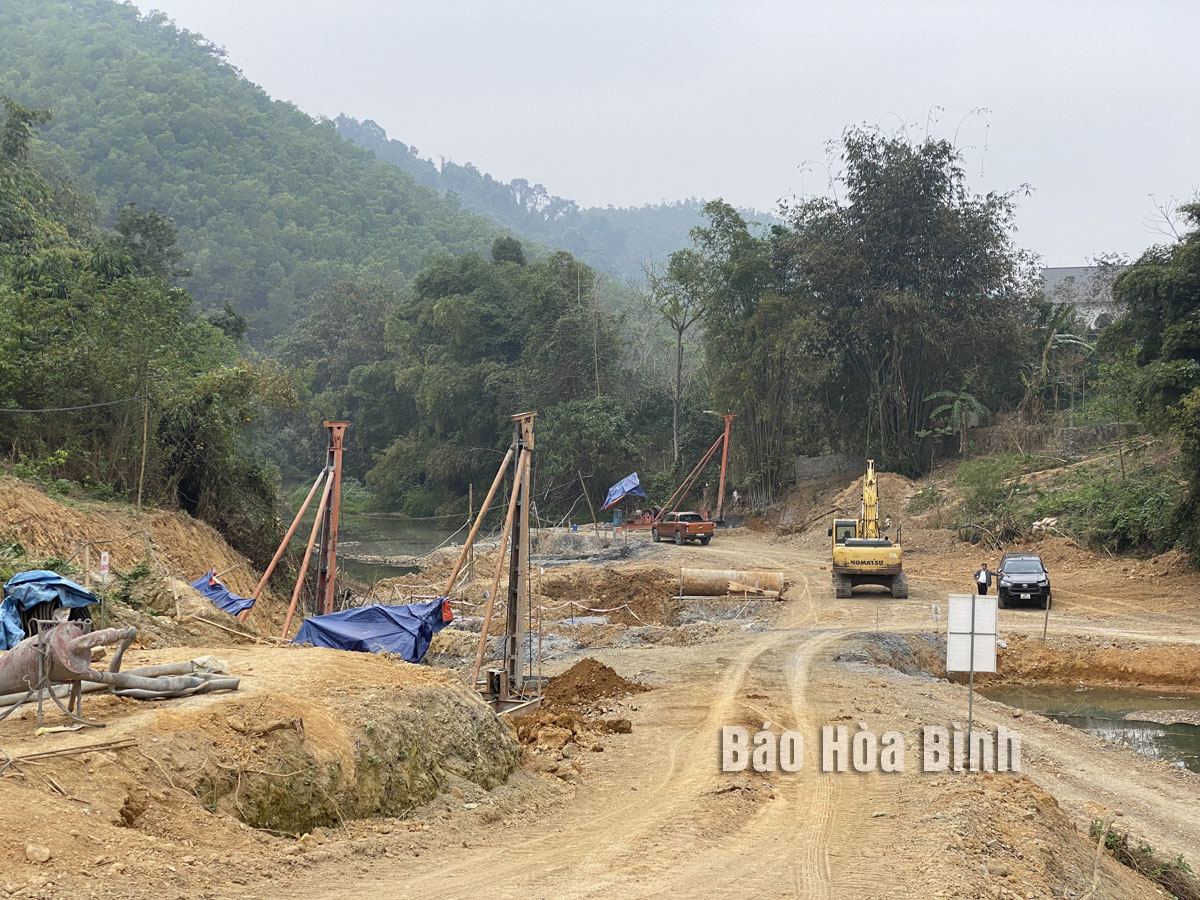
The provincial People’s Committee has worked to accelerate the construction of the Hoa Binh – Hanoi highway and the Hoa Binh – Moc Chau section of the Son La highway, which received in-principle approval from the provincial People’s Council in 2021.
Construction sped up for the highway section
that runs through Du sang Commune, Kim Boi district.
Kim Boi and Luong Son districts and Hoa Binh
city rushed to carry out compensation and resettlement work.
Kim Boi issued 18 decisions to retrieve 24.52
hectares of land in Du Sang, Binh Son, Vinh Tien, Dong Bac, and Vinh Dong
communes and Bo town. As much as 56.96 billion VND (2.31 million USD) was
disbursed for compensation and site clearance costs. The district also
implemented three sub-projects to develop a resettlement area in Du Sang and
Vinh Tien communes, and one in Ving Dong commune.
Meanwhile, Luong Son district approved four
decisions on land and asset compensation with a total value of 26 billion VND.
It expects to hand over around 1.5 kilometres of road in March.
As for Hoa Binh city, compensation measures for
122 households is being penned while a decision on compensation plan for
graves, land and assets on land worth 224 million VND has been approved. The
city is proposing a compensation plan for residential land and agricultural
land valued some 20 billion VND.
The management board of the local transport
projects joined hands with competent departments and sectors to remove
bottlenecks regarding land filling plans, waste disposal arrangements, changes
in forest use purposes, and moving electricity lines.
After the site clearance was completed, the
contractor carried out construction on the section connecting Kim Boi district
with Hoa Lac – Hoa Binh expressway intersection. To date, 61.08% of the
workload has been completed.
Vice Chairman of the Kim Boi district People’s
Committee Tran Tuan Son said that the construction is underway at the sites of
Chieng bridge (Vinh Dong commune), Bai Chau bridge (Dong Bac commune), Dong
Ngoai bridge (Vinh Tien commune), Kham bridge (Binh Son commune), and Chuon and
Chuon 1 bridges (Du Sang commune).
The district is working to accelerate site
clearance at the remaining three sites, he added.
The highway construction project is among the
key ones which will create a locomotive for local socio-economic development.
Therefore, the provincial People’s Committee has paid due attention to handling
roadblocks to push ahead the construction progress. Most recently, Vice
Chairman of the provincial People’s Committee Quach Tat Liem inspected the
construction progress at the sites. He asked the investors, departments,
sectors, districts and city where the highways run through to drastically
settle the site clearance work and accelerate construction for the roads.
Hoa Binh province is undergoing a dynamic transformation amid Vietnam’s national digital transition. Building on Poliburo’s Resolution No. 57-NQ/TW on breakthroughs in science, technology, innovation, and national digital transformation, the province has rolled out a wide range of practical action plans. A standout initiative is the "Digital Literacy for All” movement, an effort to ensure that no one is left behind in the digital era.
Hoa Binh province is undergoing a dynamic transformation in the wake of the national digital transformation movement. Building on Resolution No. 57-NQ/TW of the Politburo on breakthroughs in science, technology, innovation, and national digital transformation, the province has implemented a wide range of practical action plans. A standout initiative is the "Digital Literacy for All” movement ambitious effort to ensure that no one is left behind in the digital age.
With a spirit of unity and proactive problem-solving, the Party Committee, the government and the people of Dong Lai Commune (Tan Lac District) have made great strides in implementing the resolutions of the 24th Party Congress of the commune for the 2020 - 2025 term. Focusing on leadership and practical actions, the commune has brought the Party’s resolutions into daily life, creating strong impacts and pushing the local development forward.
Amid the nationwide push for digital transformation, young people in Hoa Binh Province are stepping up as dynamic pioneers, applying technology to enhance Youth Union operations and expand the reach of youth-led initiatives. Through creativity and adaptability, Youth Union organizations at all levels have introduced a series of practical solutions, contributing to modern governance and community development.
In recent years, An Nghia commune, located in Lac Son district, has stepped up administrative reform, focusing on improving the quality and efficiency of its single-window service unit for receiving and processing administrative procedures. These improvements have helped create favourable conditions for local residents and organisations to handle administrative procedures, contributing to the commune’s broader socio-economic development.
The Prime Minister-approved master plan to develop the multi-use value of forests ecosystems through 2030, with a vision to 2050, aims to improve the management and sustainable use of forest resources, create jobs, increase incomes, and improve the living standards of ethnic minorities, people in mountainous and remote areas, forest workers and those living near forests.



